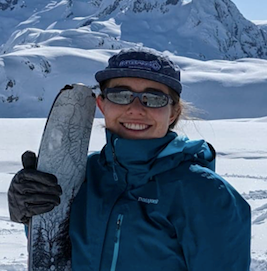 Field-based research provided Travis Gingerich with the chance “to experience so many landscapes and remote locations that would otherwise be very difficult to get to. Once there, you get to know them on a much more intimate level than you ever would as a tourist or traveler.”
Field-based research provided Travis Gingerich with the chance “to experience so many landscapes and remote locations that would otherwise be very difficult to get to. Once there, you get to know them on a much more intimate level than you ever would as a tourist or traveler.”
During field studies, samples are collected and a technique known as optical dating, or optically stimulated luminescence (OSL) dating is used to provide a measure of time since sediment grains were deposited and shielded from further light or from heat exposure. This technique plays a critical role as Travis works toward the completion of his master’s.
The majority of Travis’s research experience at UFV was with Dr. Olav Lian working in the Luminescence Dating Laboratory preparing samples collected in the field, measuring their luminescence signals, and analyzing the data. Sediment samples are collected and dated for the purpose of understanding the nature of long-term environmental change.
“One memorable field-study, on Quadra Island, we were working on a project to do with clam gardens. (Clam garden construction) is an ancient practice by coastal First Nations people, where break-waters are built out into the inter-tidal zone to create a larger space in which they could farm clams. During my first field season as a research assistant, I was able to join a trip to investigate clam gardens from a dating perspective, to help find out when these structures were built. Experiencing the stillness of the sea and forest was amazing and made me recognize that we, as humans, have been interacting with this environment longer than we can fathom,” Travis recalls.
“(Being a research assistant) opens so many opportunities going forward,” Travis notes. “It lets you see what research is out there before you go into the workforce. You pick up lab skills outside of class that are valuable in many different industries.”
Having the opportunity to work alongside master’s students and other researchers provided Travis with valuable insight into what to look for when conducting field-based research making for a much more rewarding research experience.
Supervisor, Dr. Lian, remembers Travis Gingerich as “an exceptional research assistant and a researcher in his own right. He quickly evolved from an assistant to a colleague who was eager to help train and mentor more junior students. It is not surprising that he has decided to pursue the honourable career of teaching science.”
Following four years at UFV, Travis graduated with a Bachelor of Science Honours degree in Physical Geography. He subsequently entered the Master of Science program at Simon Fraser University (SFU) with full scholarship and conducts most of his master’s research back in UFV’s Luminescence Dating Laboratory.

